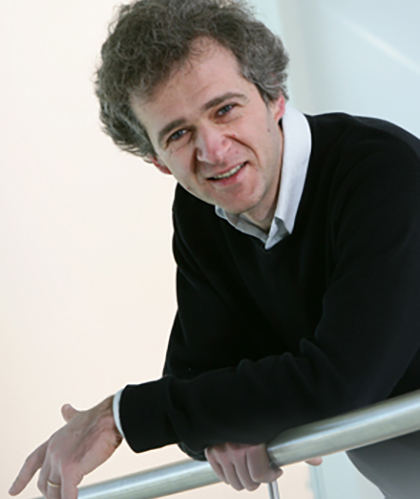
Barg, Alexander
The Institute for Systems Research
Alexander Barg is a Professor in the Department of Electrical and Computer Engineering with a joint apppointment at the Institute for Systems Research. He is also an adjunct professor in the Department of Computer Science. He received a Ph.D. in electrical engineering from the Institute for Problems in Information Transmission (IPPI) of the Russian Academy of Sciences, Moscow. He has been a senior reseacher at the IPPI since 1987. He was a member of technical staff of Bell Laboratories of Lucent Technologies in 1997-2002 before joining the faculty at UMD.
Barg is a member of the editorial board of Problems of Information Transmission, SIAM Journal on Discrete Mathematics, and Advances of Mathematics in Communication. He has previously served as an editor for coding theory of the IEEE Transactions on Information Theory. He was organizer of the DIMACS Workshops "Codes and Association Schemes" (1999) and "Algebraic Coding Theory and Information Theory" (2003) and served Technical Program Co-Chair of the IEEE International Symposium on Information Theory, Seattle, WA (2006).
Honors and awards
Richard W. Hamming Medal, IEEE, 2024
IEEE Information Theory Society Paper Award, 2015
IEEE Fellow (2008)
Editorial Board, Advances in Mathematics of Communication, 2006 - present
Editorial Board, Serdica, Journal of Computing, 2005 - present
Editorial Board, SIAM Journal on Discrete Mathematics, 2004 - present
Editorial Board, Problems of Information Transmission, 1993 - present
Editorial Board, IEEE Transactions on Information Theory, 1997 - 2000
Coding theory, information theory, combinatorics, geometry, cryptography, and applied problems in communications, storage, and data protection. Current topics include channel models and error correction for memories and storage; private distribution estimation.
Barg honored with 2024 IEEE Richard W. Hamming Medal
The medal is the highest IEEE-wide award for exceptional contributions to information sciences, systems and technology.Barg is PI for new quantum LDPC codes NSF grant
The project studies a class of quantum codes known as low-density parity-check codes, promising contenders for facilitating fault-tolerant computations.ECE Names 2022-2023 Distinguished Dissertation Fellows
Fellowship recognizes excellence in researchNew quantum framework yields generalizations of bosonic ‘cat codes’
The codes are particular instances of quantum versions of spherical codes, a family well known in classical coding theory.New data coding methods for large data centers
With new NSF funding, Alexander Barg will construct methods to recover data when individual servers fail.Barg receives NSF grant to investigate coding-theoretic methods
The project aims at new characterizations and applications of uniformly distributed sets of binary sequences.Ye, Barg win IEEE Data Storage Best Paper Award
The paper was published in IEEE Transactions on Information Theory, and was part of Ye's doctoral thesis.Barg is principal investigator for new NSF information recovery award
The project addresses data storage issues connected with modern, large-scale distributed storage systems.Alexander Barg receives NSF grant to study theoretic aspects of local data recovery
The project addresses fundamental problems in data coding that can improve distributed storage systems.Grad student Min Ye is finalist in Bell Labs Shannon competition
A student of Alexander Barg, Ye will present his work on coding solutions for distributed storage.Barg, Tamo named winners of IEEE Information Theory Society Paper Award
Award was given for their paper, "A family of optimal locally recoverable codes."Itzhak Tamo Accepts Assistant Professorship
Tamo, a post-doc in ECE and ISR under Professor Barg, will join the Department of Electrial Engineering Systems at Tel Aviv University.Barg receives NSF grant to develop better methods of storing large amounts of data
The research will develop more efficient data management procedures for large-scale distributed storage systems.Alum Ara Mazumdar begins position at University of Minnesota
The 2011 Ph.D. alumnus was a student of Professor Alexander Barg (ECE/ISR).Alexander Barg receives NSF grant for polar code research
Research will address the properties of polar codes in nonbinary communication channels.Alexander Barg awarded NSF grant to develop genotyping theory
Theory also will have applications in channel analysis, fingerprinting and identification coding, and error-control coding.Arya Mazumdar wins information theory student paper prize
Ph.D. student wins for paper co-written with advisor Alexander Barg.Alexander Barg receives NSF grant for improving error-correcting coding
Research could lead to faster methods of information transmission over the Internet and in flash memory and other storage systems.Fourteen ISR-affiliated students receive Ph.D.s
Congratulations to our ISR-affiliated doctoral graduates!Barg wins NSF grant for applications of coding theory to digital circuit design
Research will benefit technologies from circuits and memory chips to VLSI architectures.Barg gains NSF grant to study point allocations
Research explores multivariate positive definite polynomials and their applications via SDP.ECE Faculty Honored at Inaugural Scholarship & Research Celebration
Twenty-seven ECE faculty members honored, representing 1/8 of researchers recognized university-wide.Alexander Barg elected IEEE Fellow
Professor is recognized for contributions to coding theory.Barg receives NSF theoretic analysis grant
Research involves information theory and code design for digital fingerprinting.InterDigital becomes ISR strategic partner
Company to collaborate with Professors Narayan, BargNarayan earns NSF grants for wireless research
Research focuses on free-space optical and radio frequency wireless hybrid communication systems.Alexander Barg joins ISR faculty
Research interests are in coding, information theory, algorithms and cryptographyInstitute of Electrical and Electronics Engineers (IEEE)
- Fellow, 2007
- NSF: Quantum LDPC codes: structure and logical operations
- Coding-theoretic methods in discrepancy and energy optimization, with applications
- From Storage Codes to Recoverable Systems
- NSF: CIF: Information Recovery Under Connectivity and Communication Constraints
- Computing and Communication Foundations: Coding and Information - Theoretic Aspects of Local Data Recovery
- NSF CIF: Efficient Codes and their Performance Limits for Distributed Storage Systems
- NSF Collaborative Research: A General Theory of Group Testing for Genotyping
- Ordered Metrics and Their Applications
- New Approaches to the Design and Analysis of Graphical Models for Linear Codes and Secret Sharing Schemes
- NSF Collaborative Research: Multivariate positive definite polynomials and their applications via SDP
- NSF: Collaborative Research: Coding for Nano-Devices, Flash Memories, and VLSI Circuits